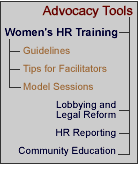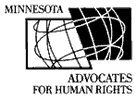|
|
|
WOMEN’S HUMAN RIGHTS TRAINING Women’s human rights training is an advocacy strategy used to both inform participants about complex problems and concepts and also to change the way that the participants respond to gender-based violence. The UN Committee on the Elimination of All Forms of Discrimination against Women highlights gender-sensitive training as one of the essential measures States should undertake in order to effectively implement the Convention on the Elimination of All Forms of Discrimination. In General Recommendation 19, the Committee recommends both “[g]ender-sensitive training of judicial and law enforcement officers and other public officials . . . “ and “education and public information programmes to help eliminate prejudices which hinder women's equality.” (Rec. 24 (b) and (f)). Successful training initiatives addressing gender-based violence should target a broad audience, including non-governmental organizations (NGOs), social service providers, law enforcement agencies, the judiciary, government officials, the media, relevant professionals, at-risk groups and the general public. Training programs aimed at addressing violence against women should focus the attention of the participants on desired changes in society and governmental agencies and on the concrete steps that need to be taken to eliminate violence and provide support for victims. This section of the website includes Guidelines for Developing a Training Program which are designed to introduce advocates to a methodology for conducting training for the general public as well as individuals and organizations involved in addressing violence against women. It is recommended that advocates first familiarize themselves with these Guidelines, which provide the necessary background information for understanding the sample training materials related to domestic violence, sexual assault, sexual harassment and trafficking in women. In order to conduct a training on any of the areas of violence mentioned above, the facilitators themselves must have an in-depth comprehension of the concepts of ‘gender’ and ‘gender-based violence’ in order to impart these concepts to the participants during the training sessions. For this reason, the Guidelines also include model sessions, intended to increase understanding of gender-based violence. Facilitators may wish to use these sessions for their own reference or adapt them as introductory sessions to a larger training program. For a training program to accomplish the learning objectives, it must be tailored to the local situation and country-specific characteristics. The information presented on this website is tailored to the needs of individuals and organizations working on the issues of violence against women in Central and Eastern Europe and the Commonwealth of Independent States. It is also recommended that facilitators use their own judgment to decide which training materials best relate to the current understanding of violence against women in the country of the training, the goal of the training program and the group composition. Thus, facilitators are encouraged to adapt the training materials included on this site. |
| Home | Contact | Feedback | Disclaimer |

